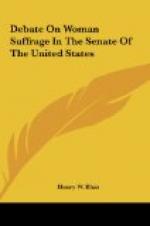I, as a citizen of the United States, as a citizen
of the State of New York and city of Rochester,
as a person who had done something at least that
might have entitled her to a voice in speaking
for herself and for her class, in all that trial I
not only was denied my right to testify as to
whether I voted or not, but there was not one
single woman’s voice to be heard nor to be considered,
except as witnesses, save when it came to the judge
asking, “Has the prisoner any thing to say
why sentence shall not be pronounced?” Neither
as judge, nor as attorney, nor as jury was I allowed
any person who could be legitimately called my peer
to speak for me.
Then, as you will remember, Mr. Justice Hunt not only pronounced the verdict of guilty, but a sentence of $100 fine and costs of prosecution. I said to him, “May it please your honor, I do not propose to pay it;” and I never have paid it, and I never shall. I asked your honorable bodies of Congress the next year—in 1874—to pass a resolution to remit that fine. Both Houses refused it; the committees reported against it; though through Benjamin F. Butler, in the House, and a member of your committee, and Matthew H. Carpenter, in the Senate, there were plenty of precedents brought forward to show that in the cases of multitudes of men fines had been remitted. I state this merely to show the need of woman to speak for herself, to be as judge, to be as juror.
Mr. Justice Hunt in his opinion stated that suffrage was a fundamental right, and therefore a right that belonged to the State. It seemed to me that was just as much of a retroversion of the theory of what is right in our Government as there could possibly be. Then, after the decision in my case came that of Mrs. Minor, of Missouri. She prosecuted the officers there for denying her the right to vote. She carried her case up to your Supreme Court, and the Supreme Court answered her the same way; that the amendments were made for black men; that their provisions could not protect women; that the Constitution of the United States has no voters of its own.
Mrs. SPENCER. And you
remember Judge Cartier’s decision in my
case.
Miss ANTHONY. Mr. Cartier
said that women are citizens and may be
qualified, &c., but that it
requires some sort of legislation to
give them the right to vote.
The Congress of the United States notwithstanding, and the Supreme Court of the United States notwithstanding, with all deference and respect, I differ with them all, and know that I am right and that they are wrong. The Constitution of the United States as it is protects me. If I could get a practical application of the Constitution it would protect me and all women in the enjoyment of perfect equality of rights everywhere under the shadow of the American flag.
I do not come to you to petition for special legislation, or for any more amendments




